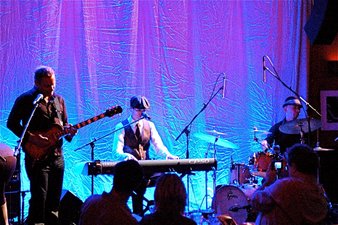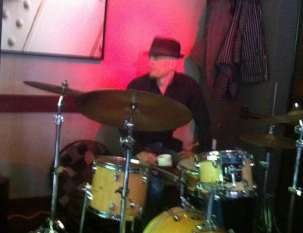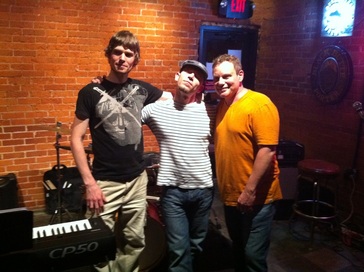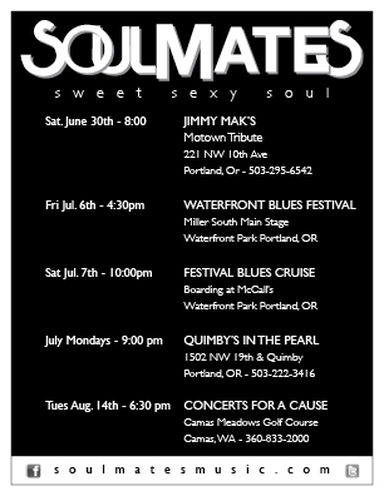
Rescue workers from around the world answered the need and money poured in for the clean-up and restoration. But what could a musician do? This was the question raised by almost all of the musicians in Japan. What can we do?
The answer from the disaster vicitms was almost universal: "Sing to us and makes us smile for a while."
Jarrod Lawson of SoulMates responded in a way that only someone with his heart and talent could; he wrote a song that has become a SoulMates standard. Everything I Need is his answer to the cry of all those who have suffered loss of any kind. He had Japan in mind when he wrote it but it has become a balm to those who are in pain. We look around at our loved ones and we are soothed by their presence.
With Jarrod's kind permission, I am reprinting his copyrighted lyrics. Of all my prized possessions, Jarrod's hand-written lyrics of this song are among my most treasured.
After that great storm
And everything we had was gone;
All of our worldly possessions laid to waste.
As we stood there and we stared
In that field of despair, I realized
I've got everything I need right here.
Everything I need.
Human kind seems to be
Marked by the proclivity
To covet things material
And disregard the spiritual.
Idols do we make of all that we accumulate
But they're just a souvenir and nothing to be revered.
Nothing to be revered.
In the blink of an eye,
We're here and then we're gone.
So little time that we have been given.
Why waste that precious time
In pursuit of what is yours and what is mine?
So gather together my people, my friends and my family
And I'll have everything I need.
Everything I need.
Everything I need.
Everything I need.
(Copyright 2011 by Jarrod Lawson. All rights retained.)
Amazing. The imagery is so very stark with visions of fields strewn with rubbish that were once treasures; a lost battle with nature. The sight of wide-eyed disaster victims who can only stare at the wreck of their homes and possessions dominates two-thirds of the song.
Life is like that. We spend so very much time looking at what has been lost and we too often come late to the unveiling that those things should never have had so great a grip on us. As Jarrod states, we have made idols of things that are just remembrances and should never have assumed supreme importance. And, of course, Jarrod's use of the word proclivity is enough to make any writer miss a heartbeat or two.
The question Jarrod asks is the correct question to be asked of every human--why waste time on the temporary and material? In Plato's thinking, the material was not even real as it was subject to change and decay and passing. The only reality was in the realm of the ousia, the realm of idea and spirit.
Jarrod arrives at Plato's conclusion that the things of the spirit--love, friendship--are the true reality. To hold to the material is to hold onto what is sure to fail. Real love and friendship, however, are the things that last; even beyond disaster and ruin. Even earthly life passes but love endures past the grave, if only in the hearts of those remaining. That is part of everlasting life, too. We remain in friends' hearts even when our bodies have failed.
As the character Balian (Orlando Bloom) asks the memory of his deceased wife, "How can you be in hell, when you are in my heart?"

The opening lines, After that great storm/And everything we had was gone/All of our worldly possessions laid to waste/ As we stood there and we stared/In that field of despair are introduced by very bluesy chord structure and piano playing. Reinhardt Melz provides accents that are stark and that enhance the overall mood of the opening and the middle. And Jay "Bird" Koder's guitar isn't a whine but a soft wail. It is heart-rending and the music drives home the power and pain of the images. Even the realization of the truth in the last two lines are almost hesitant, as if trying to convince oneself of that truth. "Everything I need" gets repeated almost in the sense of saying it over again to make the wisdom of the words take hold.
But the second stanza becomes reflective and self-critical in a positive way. How can we be so short-sighted as we grieve over lost things? We remain and our loved ones remain with us. What more is needed to find joy? The last three lines begin with Idols do we make of all that we accumulate/ But they're just a souvenir and nothing to be revered and this is the uphill climb to the truth which reaches a crescendo and then diminishes to the realization that they are "nothing to be revered" and then that line is repeated in a sad acceptance of wasted time and energy. It is well-crafted music that is well-inspired and is now so well done!
The third stanza begins by a retaining of the melancholy but it is not the sadness springing from lost possessions but of lost time. Jarrod's vocals with Bird's now preaching (in a good way) guitar and Reinhardt's triumphal drumming portray a rallying of the soul and the call to witness of loved ones near and far. The song which began as a lament becomes an anthem and declares that you are everything I need.
Now the line Everything I need is repeated three times to conclude the song. Where it was repeated once in the first stanza to impress the idea upon oneself, the three-fold repetition is a cheer moving past regret and through acceptance into pure delight.
When SoulMates perform the song, Jarrod calls the ending of the song by saying "Here we go!" and the music finishes in triumph. That call of "Here we go" has become an integral part of the song because it is also the call to a new way of thinking and a life of joy. It is the prophetic announcement to arise from the place of mourning and to journey into life and love.
The song is an emotional and gripping revelation of what is important and what is not. For as long as we remain in each other's hearts, we have everything we need.





 RSS Feed
RSS Feed
